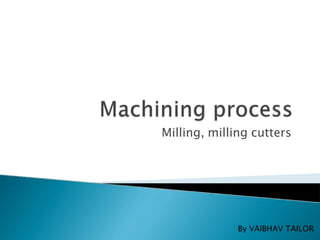
millingcutters.pptx
- 1. Milling, milling cutters By VAIBHAV TAILOR
- 2. ⦁ Milling is the machining process of using rotary cutters to remove material from a work piece by advancing in a direction at an angle with the axis of the tool. ⦁ Milling cutters ◦ Milling cutters are cutting tools typically used in milling machines or machining centres to perform milling operations
- 3. ⦁ Plain or slab milling ⦁ Face milling ⦁ End milling ⦁ Side milling ⦁ Angular milling ⦁ Form milling ⦁ Straddle milling ⦁ Gang milling ⦁ Gear Cutting
- 4. ⦁ Plain Milling, also called Surface Milling or Slab Milling, is milling flat surfaces with the milling cutter axis parallel to the surface being milled.
- 5. ⦁ Face milling is the milling of surfaces that are perpendicular to the cutter axis. Face milling produces flat surfaces and machines work to the required length. In face milling, the feed can be either horizontal or vertical.
- 6. ⦁ A rotating cutting tool having a cylindrical shank with teeth at the end, used for machining the faces and sides of metal pieces and other objects.
- 7. ⦁ the process of milling surfaces that are at right angles to the axis of rotation of the cutter with a side milling cutter.
- 8. ⦁ Machining of a flat surface at an angle, other than a right angle, to the axis of revolving cutter.
- 9. ⦁ Form milling is the process machining of special contours composed of curves and straight lines, or entirely of curves, at a single cut. This is done with milling formed cutters, shaped to the contour to be cut.
- 10. ⦁ When two or more parallel vertical surfaces are machined at a single cut, the operation is called straddle milling
- 11. ⦁ Gang milling is the term applied to an operation in which two or more milling cutters are mounted on the same arbor and used when cutting horizontal surfaces.
- 12. ⦁ Gear cutting is any machining process for creating a gear on milling machine using gear milling cutter.